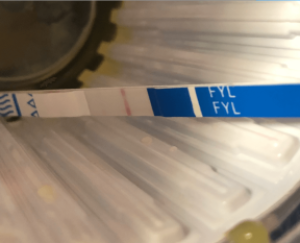Rhode Island took a big step toward marijuana legalization this week as a long-awaited compromise marijuana legalization bill rolled out. On Tuesday, Sen. Joshua Miller (D-Cranston, Providence) and Rep. Scott Slater (D-Providence) introduced identical House and Senate bills to legalize, regulate and tax recreational marijuana in the state.
The bill, the Rhode Island Cannabis Act (
Senate Bill 2430 and
House Bill 7593) would legalize the sale of up to one ounce of marijuana for those age 21 and up, with no more than 10 ounces for personal use kept in a primary residence, effective October 1. It would also allow Rhode Islanders to grow three plants at home.
And this looks like the year it could actually get done. Democratic Gov. Dan McKee (D) is down for legalization and included a proposal to end cannabis prohibition as part of his annual budget plan in the form of House Bill 7123 in January.
Similarly, House Speaker Joe Shekarchi (D), who has been working with the governor and lawmakers to find a compromise between differing approaches, is now on board and calls legalization "inevitable." Likewise, Senate Majority Leader Michael McCaffrey (D-Warwick) is fully supportive.
"We've been working hard since the end of last session to establish consensus on the details, but our efforts to address the issue have been going on for many years, during which time our neighboring states have already made this move ahead of us. Rhode Island is now behind them from a competitive standpoint, since it's fairly easy for most Rhode Islanders to cross the state line to make a legal purchase," McCaffrey said in a statement on Tuesday. "The truth is, legal cannabis is already widely available to Rhode Islanders, but the resulting revenue is not. With this bill, we will create jobs, revenue and control in our own state, and help address some of the inequities that have resulted from prohibition."
The main bone of contention had been who would regulate the legal market, and this legislation addresses that with a sort of hybrid consisting of a new independent Cannabis Control Commission and a Cannabis Office within the Department of Business Regulation. The two agencies, along with a new advisory board, would share responsibility for overseeing the operation of the market.
The bill would allow up to 33 retail pot shop licenses distributed in six zones statewide, including nine compassion centers that could potentially be hybrid recreational and medical retailers. It addresses social equity concerns by requiring that 25 percent of new retail licenses go to applicants who qualify as social equity businesses and another 25 percent of licenses go to worker-owned cooperatives. There is also a funding stream for social equity grants and job training to be generated by fees.
Retail marijuana could be taxed at up to 20 percent via a sales tax of 7 percent, a local sales tax of 3 percent, and an excise tax of 10 percent. State tax revenues would go to the general fund and could be used to pay for expenses related to running a legal marijuana system.
"The time for Rhode Island to move forward with cannabis legalization is now. This historic shift in public policy will create a vibrant new marketplace in our state and end the failed practice of prohibition, which has caused such harm to so many in our communities. To help address those past wrongs, and to ensure all Rhode Islanders have the opportunity to share the economic benefits associated with legalization, equity is a central focus of this legislation," said Sen. Miller chairman of the Senate Health and Human Services Committee, in his statement announcing the legislation.
"It is the right public policy for Rhode Island to make cannabis possession and sales legal. We have been studying legalization proposals here for many years, and we now can look to our neighboring states' experiences and see that taxing and regulating cannabis makes sense," said Rep. Slater. "I'm especially proud that we have made a very deliberate effort to address social equity through this bill. We have to recognize the harm that prohibition has done to communities, particularly minorities and poor, urban neighborhoods, and ensure that those communities get the support they need to benefit from legalization."
At the Tuesday rollout, legislative leaders made it clear that while the bill is the result of months of negotiations, it is only at the beginning of the legislative process, and the sausage is about to be made.
"I want to emphasize that the bill introduced today is not the final product -- rather, it is the beginning of the public process of legalizing cannabis for recreational use in Rhode Island," Shekarchi said in a statement during the rollout. "We welcome input from the public as to whether or how we should implement recreational usage, and I expect robust discussions with House membership as well."
Still, it seems like the stars are aligning for marijuana legalization this year in the Ocean State. Stay tuned.
back to top
A Raleigh cop gets caught slinging cocaine from his patrol car, a small-town North Carolina former police chief just got himself in even bigger trouble, and more. Let's get to it:
In Chadbourn, North Carolina,
the former Chadbourn police chief was arrested last Thursday after faking his own death to try to avoid prosecution on more than 80 felony charges. Ex-Chief Anthony Spivey, 36, had been due in court last Monday but skipped out and staged his own suicide, only to be caught hiding at his aunt's apartment. He had been chief in the small town until April, when he was slapped with dozens of charges and accused of regularly raiding the police department's evidence locker, destroying evidence, trafficking opium and selling seized weapons to friends and family. He now also has 40 outstanding warrants for failure to appear on those charges. He went down because the State Bureau of Investigation grew curious about why confiscated drugs were not being sent to the state crime lab.
In Washington, DC, a DC correctional officer was arrested last Thursday for allegedly smuggling drugs, knives, and other contraband into the jail in return for cash bribes. Guard Johnson Ayuk, 31, went down after an internal investigation at the jail found that he had been accepting payments from a detainee's girlfriend to bring contraband into the jail. He did so by hiding it beneath compression shorts. He is charged with bribery and providing or possessing contraband in prison.
In Raleigh, North Carolina, a Raleigh police officer was arrested last Thursday for selling cocaine from his patrol car while on duty. Officer Keven Rodriguez, 33, went down after the police department and the DEA developed information that he was distributing controlled substances in the area. Authorities did a controlled buy, with an informant giving Rodriguez $2,600 in cash and Rodriguez then sold him two ounces of cocaine. He now faces one count of distribution of a quantity of cocaine and one count of possession of a firearm in furtherance of, and using and carrying a firearm during, a drug trafficking crime. He's looking at a mandatory minimum of five years in federal prison and up to life.
back to top
A California bill would provide protections to workers for off-duty marijuana use, the New Mexico Supreme Court rules medical marijuana purchases are not subject to a state tax, and more.

(Creative Commons)
California Bill Would Protect Marijuana Users from Employment Discrimination. Assembly Member Bill Quirk (D) has filed a bill, Assembly Bill 2188, that would bar employers from punishing workers for off-duty marijuana use. The bill would end discrimination against marijuana-using employees based on testing for metabolites, the non-psychoactive substances that can be detected in drug tests for days or weeks after marijuana use. The bill is supported by California NORML, which noted that "testing or threatening to test bodily fluids for cannabis metabolites is the most common way that employers harass and discriminate against employees who lawfully use cannabis in the privacy of their own homes."
Maryland House Gives Initial Approval to Marijuana Legalization Referendum Bill. The House on Wednesday gave initial approval to House Bill 1, which, if passed, would place before voters the following question: "Do you favor the legalization of adult -- use cannabis in the State of Maryland?" If voters approved it, the General Assembly would then be charged with writing the rules covering "use, distribution, possession, regulation, and taxation of cannabis." The House also gave initial approval to House Bill 837, which includes measures to implement legalization if voters approve it. It sets 1.5 ounces as the legal possession limit for adults and decriminalizes between 1.5 and 2.5 ounces, as well as automatic expungement for past conduct made legal by the law. Final House floor votes on the two bills could happen as soon as Friday.
South Dakota Senate Approves Marijuana Legalization Bill. The state Senate on Wednesday approved a marijuana legalization bill, Senate Bill 3, which would let people 21 and over possess up to an ounce purchased from licensed retailers. It does not allow for home cultivation. The bill now heads to the House. South Dakota voters approved a marijuana legalization initiative in 2020, only to have it thrown out by the state Supreme Court. The organizers of that campaign are currently in a signature gathering campaign for a 2022 initiative, which would include home cultivation.
Medical Marijuana
New Mexico Supreme Court Rules Medical Marijuana Purchases Cannot Be Taxed. The state Supreme Court on Wednesday affirmed a lower court ruling that marijuana purchases by medical marijuana patients are not subject to the state's gross receipts tax. Producers had sought tax refunds in 2014 and again in 2018, only to be denied by the state Taxation and Revenue Department. In 2020, the state Court of Appeals ruled that medical marijuana should be treated like prescription drugs, which are not taxed. The Supreme Court upheld that ruling.
back to top
An Idaho legislator worried that substitute teachers are selling drugs to kids gets a teacher testing bill out of committee, Tennessee is the latest state to see a fentanyl test strip legalization bill, and more.
Marijuana PolicySouth Dakota Governor Suggests Possible Veto of Marijuana Legalization Bill. Gov. Kristi Noem (R) sounded skeptical of a marijuana legalization bill, Senate Bill 3, which has just passed the Senate, at a Wednesday press conference. Noem did not give a direct answer when asked about the issue, saying "it's hard to talk in hypotheticals," and she's "not in favor of recreational marijuana." She added that, "I still believe I haven't seen anybody get smarter from smoking dope." Voters approved marijuana legalization in 2020, only to see their decision overturned by the state Supreme Court. The activists behind the 2020 campaign are now signature gathering for a new initiative, but say they will desist if a workable legalization bill becomes law.
Opiates and Opioids
Johnson & Johnson, Drug Distributors Reach Settlement Over Opioid Lawsuits. Three of the country's largest drug distributors -- McKesson, Cardinal Health and AmerisourceBergen -- and drug maker Johnson & Johnson announced Friday that they had reached a settlement with the vast majority of states and localities that had sued them over their role in the nation's early-century opioid crisis. The companies have agreed to pay out $26 billion to settle those thousands of claims, with the first checks set to go out in April with at least 85 percent of the payments dedicated to addiction treatment and prevention services. The distributors and Johnson & Johnson released statements Friday morning, noting that the deal is not an admission of wrongdoing and that they strongly dispute the allegations. The distributors said in a joint statement that they believed that "the implementation of this settlement is a key milestone toward achieving broad resolution of governmental opioid claims and delivering meaningful relief to communities across the United States that have been impacted by the epidemic."
Drug Testing
Idaho House Committee Advances Bill Requiring Drug Testing for Substitute Teachers. Ignoring the objections of state school officials, the House Education Committee voted 8-7 Thursday to approve a bill requiring mandatory pre-employment drug testing of all substitute teachers, at a time when school districts are scrambling for substitute teachers. School officials called the proposed law unworkable and noted that districts already have their own drug testing policies. "It is unnecessary, and further, we have a policy at the local level," Karen Pyron, superintendent of the Butte County School District, told the committee. "It adds cost and inconvenience and an additional burden to our rural schools," she said. But bill sponsor, Rep. Judy Boyle (R-Midvale) retorted that she had "tremendous concerns." Substitute teaching "is a very easy way to access children and sell drugs to them," she claimed. Her reasoning prevailed in the narrowly divided committee, and House Bill 651 now heads for a House floor vote.
Harm Reduction
Tennessee Fentanyl Test Strip Bill Filed State Sen. Richard Briggs (R-Knoxville) has filed a bill to legalize fentanyl testing strips, Senate Bill 2427. They are currently considered drug paraphernalia under state law. "SB 2427 is very important for Tennessee, especially East Tennesse, where we've had a very large number of deaths from drug overdoses," said Briggs. "This bill legalizes a tool that can help save lives from drug overdoses in our state." The bill would sunset after three years unless it was renewed. The House Criminal Justice Committee is set to discuss the bill on March 2.
back to top

the latest victim of the drug war (Creative Commons)
Kentucky Democrats Roll Out Marijuana Legalization Bill. A group of Democratic lawmakers on Thursday rolled out a bill that would legalize sales, expunge marijuana crimes, treat people with medical marijuana, and tax sales for recreational use. They are calling it the "L.E.T.T.'s GROW" act (Senate Bill 186). If passed, it would create a Cannabis Control Board of seven members to establish regulations from seed to sale. The state hasn't managed to get even a medical marijuana bill passed yet, but the Democrats say legalization's economic benefits could make it attractive.
South Dakota Marijuana Legalization Bill Wins Committee Vote. The Senate Commerce and Energy Committee voted 5-3 Thursday to approve Senate Bill 3, which would legalize marijuana in the state. The bill would legalize the possession of up to two ounces by people 21 and over, but possession of between four ounces and one pound would be a misdemeanor and possession of more than one pound would be a Class 5 felony. There is no provision for home cultivation. The state Department of Revenue would be responsible for regulating the adult-use program and promulgating rules related to issues such as transportation and registration. State voters approved marijuana legalization in 2020, only to see it overturned by the state Supreme Court.
Medical Marijuana
South Dakota Tribe Aids Legal Defense of Customers Arrested by State, Local Police. The Flandreau Santee Sioux Tribe reported this week that more than a hundred people who have tribal medical marijuana cards have been arrested since it opened the state's first dispensary last year. State officials do not recognize cards issued by the tribe, and local police departments have arrested non-tribe members carrying cards and medical marijuana. "They're taking the cards and handing out fines," Tribal chairman Tony Reider said. "But most we don't know about, because most people are just paying the fines." Last year, the tribe promised to aid customers facing legal problems, and this week, it said it is currently engaged in defending at least 10 active marijuana cases involving non-members. "I don't think the state has the authority to revoke a license issued by another jurisdiction," said tribal Attorney General Seth Pearman.
Opioids
Congress Extends Trump-Era Fentanyl Analog Criminalization for Sixth Time. A group of leading civil rights advocates, grassroots community leaders, and policy experts strongly criticized the inclusion of a provision in the stopgap spending bill passed by Congress that would extend the temporary classification of fentanyl-related substances as Schedule I drugs, opting for indiscriminate criminalization over proven public health solutions. The temporary order will now last until March 11. Congress has repeatedly acted to extend it instead of investing in public health and harm reduction solutions, and President Biden is advocating for making the classification permanent -- despite promising real criminal justice reform.
International
US Suspends Mexican Avocado Exports Over Drug Cartel Threats. The US government has banned all imports of Mexican avocados after an agricultural inspector was threatened by a suspected drug cartel enforcer. Control of the avocado trade in Michoacan is contested by growers and differing drug trafficking cartels, especially the Jalisco New Generation Cartel. The threat came last Saturday via text message, one day before Mexican growers launched an expensive Superbowl ad. Guacamole lovers, act now! Prices could rise.
back to top
Virginia House Republicans block an early roll-out of recreational marijuana sales, Rhose Island lawmakers unveil a long-anticipated marijuana legalization bill, and more.

crystal meth (Creative Commons)
Rhode Island Lawmakers Unveil Much Anticipated Marijuana Legalization Bill. State Sen. Joshua Miller (D) and Rep. Scott Slater (D) on Tuesday unveiled a much-anticipated marijuana legalization bill, which would allow adults to possess up to an ounce and grow up to six plants at home, three of which can be flowering. The bill would also set up a system of licensed establishments to produce and sell marijuana. Legislators had been working for months on the bill, with one big roadblock being whether the market would be regulated by an existing agency or a new one. The bill compromises, creating a hybrid model with a new independent Cannabis Control Commission (CCC) and a Cannabis Office under the Department of Business Regulation (DBR) sharing regulatory duties.
Virginia Republicans Block Bill Legalizing Marijuana Sales. On a 5-3 party line vote, Republican members of the House General Laws Subcommittee killed a bill that would have allowed legal marijuana sales this year. Senate Bill 391 had already passed the Senate, raising hopes that the timeline for legal sales could be speeded up by allowing existing medical marijuana dispensaries to start selling to the general public in September. Legalization passed last year, when Democrats controlled both chambers. This year, the Democrats narrowly retained control of the Senate, but lost the House to Republicans.
Methamphetamine
Grassley, Feinstein Proposal to Curb Rising Methamphetamine Use Passes House, Senate with Broad Bipartisan Support. The House on Tuesday approved the Methamphetamine Response Act (HR 5021). Since the Senate passed its version of the bill, sponsored by Sens. Chuck Grassley (R-IA) and Diane Feinstein (D-CA), in December, the measure now heads to the desk of President Joe Biden. The bill declares meth an "emerging threat" and requires the Office of National Drug Control Policy (ONDCP -- the drug czar's office) to develop, implement, and make public, within 90 days of enactment, a national emerging threats response plan that is specific to methamphetamine. The bill also calls for an assessment of evidence-based prevention and treatment programs, as well as law enforcement programs.
back to top
A coalition of marijuana and civil rights groups is demanding a House floor vote on a marijuana legalization bill, the Transportation Department is moving toward approval oral drug testing for truckers, and more.

A South Dakota marijuana legalization bill got "smoked out" Tuesday, but not like this. (IRIN)
Marijuana, Civil Rights Groups Demand House Vote on Legalization Bill This Month. A coalition of marijuana reform and civil rights groups convened by the Drug Policy Alliance, the Marijuana Justice Coalition, sent a letter to House leadership Tuesday seeking a floor vote this month on the Marijuana Opportunity, Reinvestment and Expungement (MORE) Act (HR 3617). Sponsored by House Judiciary Committee Chair Jerrold Nadler, the MORE Act passed the House in the last Congress and has passed out of the committee in this Congress in September, but has been stalled since then. "Given that nearly every minute one person in this country is arrested for a minor marijuana crime, the public deserves to know if members of the 117th Congress stand on the side of justice and against the outdated and cruel policy of prohibition and criminalization of marijuana," the letter to House Speaker Nancy Pelosi (D-CA) and House Majority Leader Steny Hoyer (D-MD) said.
South Dakota Marijuana Legalization Bill Back from the Dead After Being "Smoked Out." Just one day after a House committee voted to kill the legalization bill, Senate Bill 3, it has been revived using a legislative procedure known as a "smoke out." Under that procedure, legislative leaders can poll lawmakers and if a majority signal they are in favor of proceeding with the bill, the bill can proceed to a House floor vote. "We just smoked out a weed bill," House Speaker Spencer Gosch (R) quipped when enough members stood to be counted. Voters had approved a marijuana legalization initiative in 2020 only to see it overturned by the state Supreme Court, and the activists behind that initiative are currently in the midst of a signature gathering campaign to put the issue on the ballot this year if the legislature fails to pass the bill.
Psychedelics
Utah Legislature Overwhelmingly Approves Psychedelic Therapeutic Study Bill. With a final Senate vote last Friday, the state legislature has approved a bill to set up a task force to study the therapeutic potential of psychedelics, House Bill 167. The House had passed the bill back on February 10. In each chamber, only one no vote was registered. The bill is now on the desk of Gov. Spencer Cox (R) but has a veto-proof majority in case he balks. The bill would create a task force to "provide evidence-based recommendations on any psychotherapy drug that the task force determines may enhance psychotherapy when treating a mental illness."
Drug Testing
US Department of Transportation Publishes Proposed Rules for Oral Fluid Drug Testing. The Department of Transportation last Friday a notice of proposed rulemaking for oral fluid drug testing of transportation employees covered by federal regulations. DOT said that including oral testing would help employers combat cheating on urine drug tests. Oral testing to detect the presence of marijuana only has a 24-hour window, while urine testing can detect marijuana metabolites for days or weeks. Comments on the notice of proposed rulemaking should be submitted by March 30, 2022.
back to top






